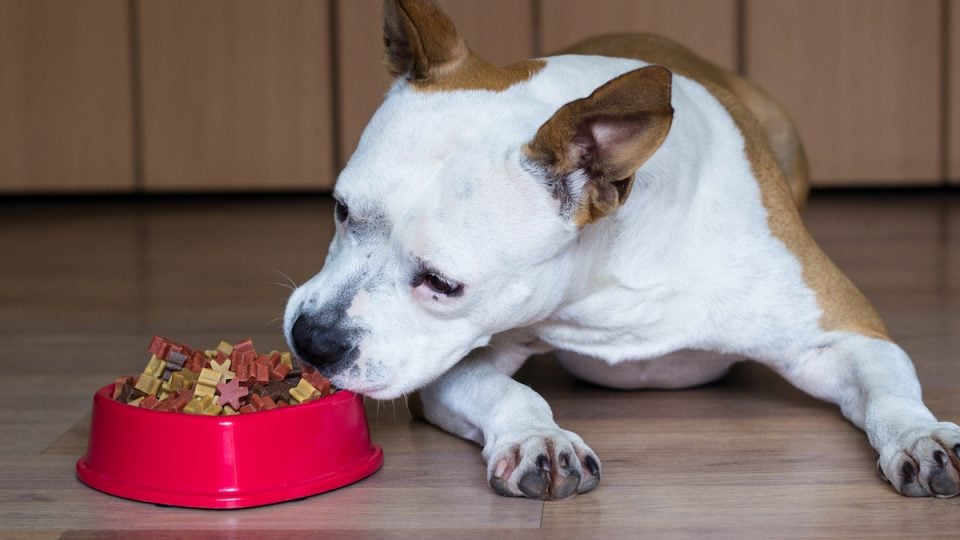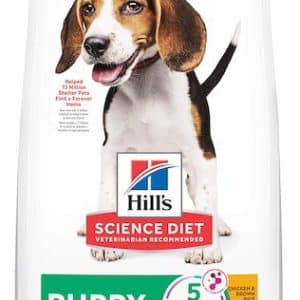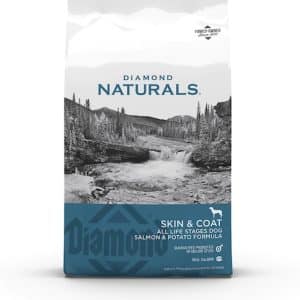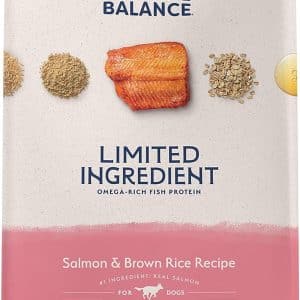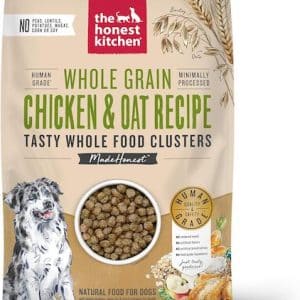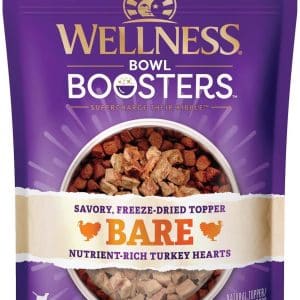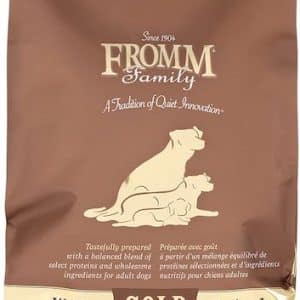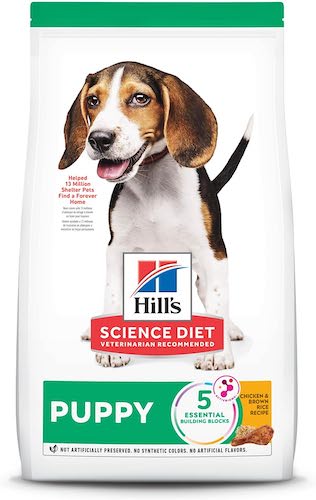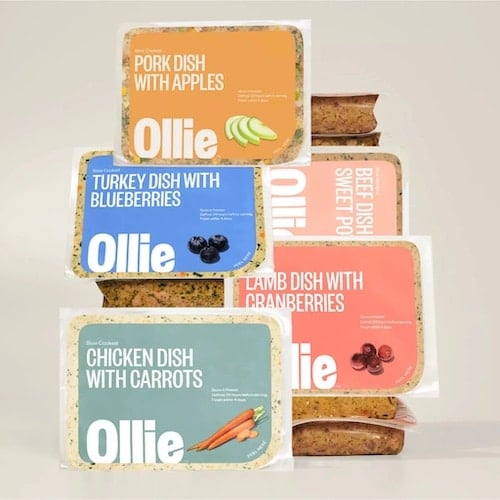- This review contains affiliate links. Read more here.
- Not a substitute for professional veterinary help.
As anyone who loves one will tell you, the Pit Bull is an affectionate, lovable, and goofy breed. These dogs thrive in loving, stable homes with good training and a well-balanced diet.
For the most part, a “well-balanced” diet for a Pit Bull looks just like it does for any pup: a careful ratio of proteins, fat, fiber, and carbs laid out by The Association of American Feed Control Officials (AAFCO). But while AAFCO standards apply to all dogs, breed-specific health and disposition tendencies can make some foods a better fit.
Pit Bulls, for example, often run into joint or hip issues, like hip and elbow dysplasia, which can make foods supplemented with glucosamine or chondroitin a good choice. They’re also prone to dry or sensitive skin, which benefits from skin and coat formulas that lean on healthy omega 3 and omega 6 fatty acids.
Not sure where to start? Hop down to our explainer on a Pit Bull’s nutritional needs, or dive into our recommendations below. Before you introduce any new foods into your dog’s diet, we suggest consulting with your veterinarian, who can help you understand any health or nutritional needs specific to your pup.
Our picks
Best for Young Pitties
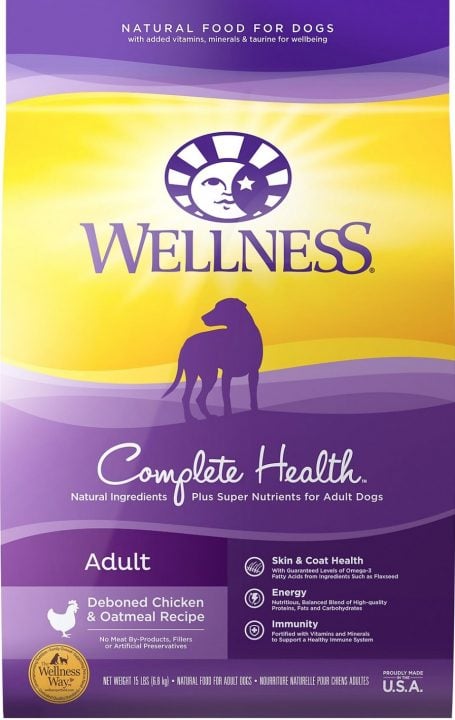
Best for Senior Pitties
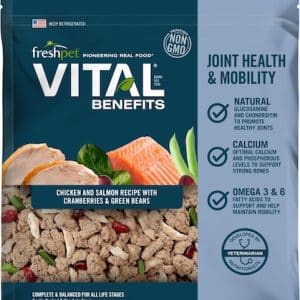
Best for Pit Bull Puppies: Hill’s Science Diet Puppy Chicken & Brown Rice
Puppies grow quickly and need dog food packed with nutrients to support that growth. Hill’s Science Diet Puppy dry food is a good option for lots of puppy breeds, including Pit Bulls, because it meets the AAFCO standard for the growth phase with a solid 25% protein. It includes chicken as the first ingredient and easy-to-digest cooked grain carbohydrates, flaxseed, vitamins, and nutrients.
The formula also includes Docosahexaenoic acid (DHA), which is critical for brain and eye development, and a blend of prebiotic fibers to help with gut and microbiome health. Since Pit Bulls are prone to dry skin and sensitivities, this kibble also includes vitamin E and omega-6 fatty acids to help support their skin and coat.
Key Nutrients:
- 393 kcal/cup
- Protein: 25%
- Fat: 15%
- Crude Fiber: 3%
- Moisture: 10%
Best for Young Pitties (1-3): Wellness Complete Health Adult Deboned Chicken & Oatmeal Recipe Dry Dog Food
Wellness is known for its quality ingredients and lack of byproducts, fillers, and artificial flavors. This recipe has a well-balanced blend of protein, fat, and carbs, with deboned chicken, chicken meal, oatmeal, and ground barley among its top ingredients.
This formula also includes antioxidant-rich foods, like spinach and blueberries, for immune health. Flaxseed provides omega fatty acids to help with skin and coat health, with glucosamine, probiotics, and taurine for joint and gut health. With strong protein and fat content, it’s a good in-between for the post-puppy phase when your doggo may still need more calories, but it might not be the best option for weight management.
Key Nutrients:
- 434 kcal/cup
- Protein: 24%
- Fat: 12%
- Crude Fiber: 4%
- Moisture: 10%
Best for Senior Pitties: Freshpet Vital Benefits Joint Health & Mobility Fresh Dog Food
Pit Bulls, especially older Pit Bulls, are susceptible to having issues with their joints. This fresh frozen joint health-and-mobility blend for all life stages helps support joints with glucosamine and chondroitin, calcium for bone health, and omega 3 and 6 acids for skin and coat health.
Older Pitties can sometimes lose a little of their enthusiasm for food, which makes this fresh food an especially good choice for picky seniors (note that it will need to be thawed and stored in the fridge). This particular recipe can be served as a full meal or used as a topper or treat.
Key Nutrients:
- 290 kcal/cup
- Protein: 14%
- Fat: 12.5%
- Crude Fiber: 1.5%
- Moisture: 65%
- Calcium: 0.6%
Best for Skin and Coat Health: DIAMOND NATURALS Skin & Coat Dry Dog Food with Wild Caught Salmon
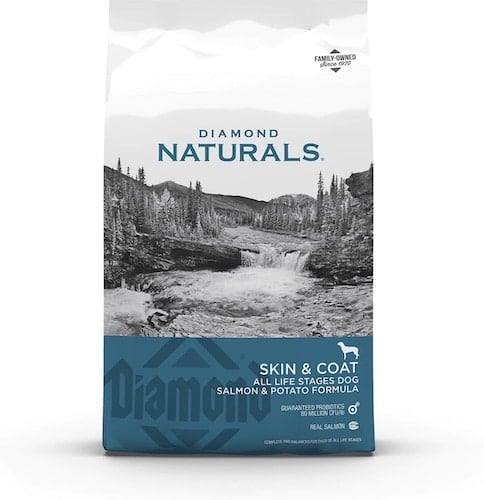
Diamond Naturals Skin & Coat Dry Dog Food
This dry dog food blend is made with omega fatty acids to support skin and coat health.
Pitties are sometimes prone to skin issues like allergic dermatitis or dryness. This dry recipe is made with salmon as the number one ingredient. Salmon is packed with omega-3 and omega-6 fatty acids that support coat and skin health. It also includes a blend of vegetables, antioxidants, prebiotics, and carbohydrates that support your pup’s overall immune health and digestion.
Key Nutrients:
- 408 kcal/cup
- Protein: 25%
- Fat: 14%
- Crude Fiber: 5.5%
- Calcium: 10%
Best for Food Allergies: Natural Balance Limited Ingredient Salmon & Brown Rice Recipe
While food allergies vary and there’s no one-size-fits-all kibble, using a formula with limited ingredients is a good first step. Natural Balance has a line of limited-ingredient dog foods, and this Salmon and Brown Rice formula is a nice option for Pit Bulls since it provides omega fatty acids that support skin and coat health. It also includes whole grains, like brown rice and oat groats, as a source of wholesome carbohydrate energy.
If your pup is allergic to salmon or fish, this line also has varieties made with Lamb and Brown Rice and Beef and Brown Rice, and grain-free varieties, including Chicken and Sweet Potato and Sweet Potato and Venison. Canned options available if your pup prefers wet food or needs a little more hydration in their diet.
Key Nutrients:
- 340 kcal/cup
- Protein: 24%
- Fat: 12%
- Crude Fiber: 4.5%
- Calcium: 0.8%
Best for Digestion: The Honest Kitchen Food Clusters Whole Grain Chicken & Oat Recipe
Pitties with sensitive stomachs won’t feel like they’re missing out with these cold-pressed, dehydrated clusters made with cage-free chicken and chicken liver and added nutrients and vitamins. It includes probiotics and fruits, like pumpkin and apple, that aid in digestion, as well as whole food antioxidants from carrots and broccoli for immune support.
It provides skin and coat support with a blend of fats from flaxseed, coconut oil, chia seeds, and salmon oil.
Key Nutrients:
- 428 kcal/cup
- Protein: 27.3%
- Fat: 16.5%
- Fiber: 5.7%
- Moisture: 12%
Best Fresh: Ollie
Ollie’s fresh food recipes are some of the most popular on the fresh market—and it’s not hard to see why. When signing up for this subscription dog food, you’ll be asked questions about your dog’s breed, size, age, and any sensitivities or allergies to help create a customized meal plan that can even have individualized portion sizes for weight loss, if needed.
Recipes include protein options with beef, chicken, turkey, lamb, and pork mixed with various vegetables, carbohydrates, and nutrients. Each recipe is created to meet AAFCO all life stages guidelines.
Key Nutrients (Beef with Sweet Potatoes):
- Protein: 32.1%
- Fat: 25%
- Carbohydrate: 35.7%
- Crude Fiber: 7.1%
Best Raw: Wellness CORE Bowl Boosters Bare Turkey Freeze-Dried Dog Food Mixer
These freeze-dried raw bites are made with turkey hearts. Since they’re high in calories and contain 65.2% protein and 21.7% fat, they are not recommended as a full-balanced meal. Their best uses are as a topper, treat, or mixed in with your dog’s kibble or canned food.
While raw food’s safety and benefits are debated, some pet parents have found it a powerful option for enticing picky eaters and resolving ongoing stomach and coat issues. On the flip side, puppies and dogs with compromised immune systems should not eat raw foods. It’s a good idea to chat with your vet before starting your pup on a raw diet.
Key Nutrients:
- 202 kcal/cup
- Protein: 65.2%
- Fat: 21.7%
- Fiber: 1.6%
- Moisture: 8%
Best for Weight Loss: Fromm Family Foods Gold Weight Management
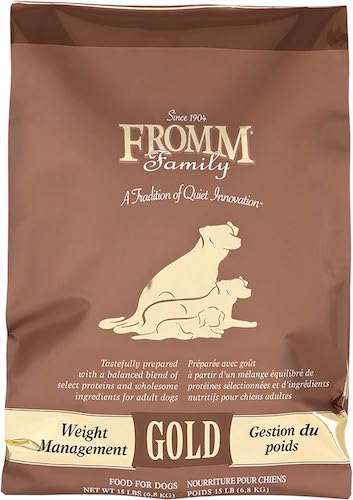
Fromm Family's Gold Weight Management
This protein and whole grain blend is a good option for weight maintenance or loss.
Fromm Family’s Gold Weight Management turkey-flavored kibble is a nice weight-loss choice for Pitties whose vets recommend a diet. It includes 25% protein and 10% fat, which meet AAFCO’s nutritional guidelines for adult dogs.
The kibble is made using a blend of proteins, whole grains that provide energy and fiber, antioxidants, and probiotics for overall health. It’s also supplemented with L-carnitine, which helps normalize blood sugar levels and lean muscle development.
Key Nutrients:
- 334 kcal/cup
- Protein: 25%
- Fat: 10%
- Crude Fiber: 10%
- Calcium: 10%
Dog Food for Pit Bulls: Specific Nutritional Needs
The “Pit Bull” breed is actually a type that encompasses several breeds, including the American Pit Bull Terrier, American Staffordshire Terrier, American Bully, and Staffordshire Bull Terrier. Though Pitties vary in size, they’re generally stocky but muscular and have square heads and short hair. Pit Bulls are active with a high prey drive, so foods high in protein from quality sources are a good match for their energy. Fatty acids in your Pit Bull’s diet can also be helpful for addressing any skin issues.
In rare cases, Pit Bulls can develop a type of heart disease called aortic stenosis. Along with proper monitoring and/or vet-prescribed medications, a well-balanced diet is key. Low sodium meals or supplemental fish oil may also be considerations for your Pitty’s heart health.
Hip dysplasia is another health condition that can affect Pit Bulls. Too much calcium and vitamin D, which helps the body absorb calcium, can hinder bone and cartilage development. So it’s a good idea to examine the vitamin content of your dog’s food carefully. This is especially important for puppies. Developing strong bones is critical during this stage, and it’s recommended to stick to a calcium level between 1.1% and 1.5%.
For Pitties experiencing joint problems or senior Pit Bulls, glucosamine is also a common supplement to add to your dog’s diet.
Dog Food for Pit Bulls: Wet Versus Dry
Wet food can be easier for dogs to chew and swallow. It’s also a good option for picky eaters. Canned food has higher water content, which can be beneficial for dogs with certain health considerations that make adequate hydration especially important. Fat and protein are also sometimes more prevalent in wet food. So it might be a good option if your Pit Bull requires a higher protein diet, but it’s not a good choice for Pitties who need to watch their fat consumption.
Dry food is often the more popular choice, as kibble has a longer shelf life than wet food. It can also be less messy at mealtimes, though you should always check the label’s date for freshness. Dry food has also been found in some cases to help maintain dental health in dogs. That is, of course, as part of a regimen with regular teeth cleanings and dental chews.
How We Chose
The products featured here were selected based on a combination of our own hands-on testing,
a comprehensive look at customer reviews across a wide variety of retail platforms and
adherence to AAFCO nutritional guidelines. We’re also guided by the experience of living and playing
alongside our own much-loved and strongly opinionated pets, who are never stingy with their
feedback.
